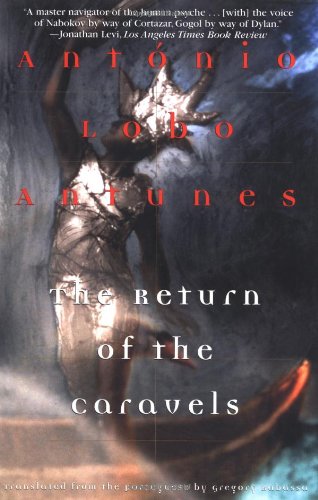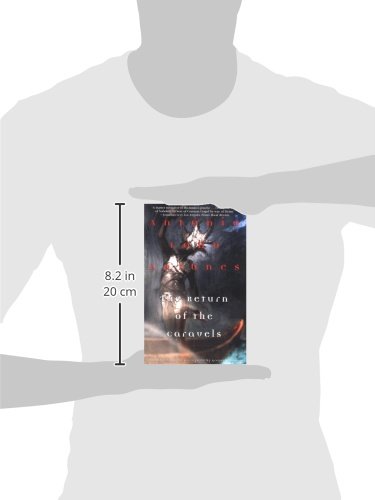


The Return of the Caravels (Antunes, Antonio Lobo)
J**I
Great Expectations Dashed...
The dissolution of the Portuguese Empire. That is the central theme of Antonio Lobo Antunes' surrealistic novel. The novel is wryly titled; the caravels were highly maneuverable sailing ships which were used in the 15th and 16th centuries as a vehicle for exploration, trade, proselytization, and colonization. The missionary, Frances Xavier, reached as far as Japan in 1549. Along the way, the Portuguese flag was planted in various pieces of real estate, and flew for 400 or so years. Bits and pieces of the empire were lost in the post-World War II period, for example, Malacca and Goa, but the real ending came in 1974, with the "carnation revolution," and the transition from dictatorship to democracy in the home country. The new democratic government almost immediately declared the colonies independent. The colonists and assorted closely related natives "came home," often by ship, thus, metaphorically on the caravels. I had previously read Ryszard Kapuscinski's compelling journalistic account of the last days of colonial rule in Angola, entitled Another Day of Life , and felt the subject could be an excellent one for a novelist.Antunes starts so well. He creates and develops an impressive array of characters, none of whom would be considered "heroic." Luis, in Angola, is attempting to bring his father, who was killed in a grenade attack, "home" to Portugal for burial. Worthy of the characters, including themselves, depicted in the works of VS and Shiva Naipaul, there is Francisco Xavier, an East Indian who got caught up in the Empire, once ran three movie houses in Lourenco Marques, Mozambique, and is now reduced to running the "Apostles of the Indies Boarding House" which caters to the flotsam of the empire as they return home. There is a couple who have lived in Guinea Bissau for 53 years, and are returning, essentially penniless, and have been invited to a "cat roast." There is Manoel de Sousa de Sepulveda, from Malanje, in northeastern Angola, who made his living from smuggled diamonds, is a pedophile, and now finds that his vacation flat in Portugal has been seized by the hoi polloi after the "socialist" revolution. There is Pedro Alvares Cabral (and others) who return with their mulatto wives, and support themselves by turning their wives out to be prostitutes.And there is no question Antunes can turn a unique phrase. In describing the Angolan rebels seizing power, he say they were "...drunk from cups of aftershave and authority." Or: "...the chandelier prisms that were sailors from an abortive mutiny hanged from the rigging, plucked clean by seagulls and Atlantic kites." Or: "...by the cirrhosis of the fluorescent lighting leaned over me like a weary pieta and I order a quart of club soda where the bubbles leaped up from the bottom like insect eggs..." Or: "...the forty-year-old vagrant women who would visit the bar, slippered and funereal, to impose the dew of their groins on men too drunk to be interested in their chimerical services..."I'm a big fan of both Joyce and Pynchon, to name a couple who have labored in the stream-of-consciousness field, as well as the "magic realism" of Marquez, but about half way through the book, despite the very promising beginning, and with so much potential, in terms of characters, the book seemed to fall off a cliff into the hallucinatory ramblings of William Burroughs in, among others, Naked Lunch At some level, the juxtaposition of characters throughout history, like Vasco de Gama anchored besides Saudi tankers, has to "work"; at least provide some sort of insight, and in that endeavor I believe Antunes failed. There must be some meaning in all the prose, and the lack of authenticity, such as "French shillings," and "schools of octopus" can be grating.This is my first work of Antunes, and I was cautioned not to commence with it, or I might not continue reading him; advice I should have respected. I understand The Fat Man and Infinity: And Other Writings is much better, and will continue to read Antunes, but for this effort I can only muster 3-stars. Another Day of LifeNaked LunchThe Fat Man and Infinity: And Other Writings
R**N
The sheer sleaziness of it all
The caravel was the workhorse vessel of the Portuguese during the Age of Discovery. Originally designed for ocean-going fishing, it was adapted by the Portuguese for carrying cargo. For its time, the caravel was speedy and maneuverable, particularly suited to beat against contrary winds and evade attacks from hostile ships. In Portuguese national mythology, the caravel has a special place as the emblematic vehicle by which Portugal spread its overseas empire.THE RETURN OF THE CARAVELS is nominally set in 1974, as the last vestiges of that empire crumbled and colonialists, or their descendants, scrambled to escape Angola, Mozambique, and Portuguese Guinea (today, Guinea-Bissau). But the novel actually spans the entire history of the Portuguese Empire, going back to the days - and including the characters - of Prince Henry, Diego Cão, and Vasco de Gama. The late 15th Century is juxtaposed with the late 20th Century, the caravels with Turkish freighters, the explorers with the exploiters - all in one phantasmagoric stewpot. There is no linear story line. Rather, the narrative keeps veering back and forth among centuries, between Lisbon and various colonies, among characters, and even between the first and the third person - sometimes all within the same paragraph, even the same sentence. The novel is populated with adventurers, opportunists, whores, pimps, charlatans, dreamers, louts, saps, rogues, and roués. There is not an ounce of nobility or grandeur. Everything everywhere is lurid and squalid.Somewhere I read that this was one of Lobo Antunes's most "accessible" novels. If that's the case, it doesn't bode well for me and the rest of his oeuvre. THE RETURN OF THE CARAVELS is tough going. It exemplifies something else I read - namely, that trying to get into one of Lobo Antunes's novels is like trying to board a freight train moving at full speed. One of the back-cover blurbs says that Lobo Antunes is an "heir to the narrative collage technique championed" by the likes of Celine, Faulkner, García Marquez, Joyce, Nabokov, Pynchon, and Calvino. I am not really qualified to endorse or to dispute that statement, but I will say that for me THE RETURN OF THE CARAVELS was more difficult to follow than was any of my readings of any of those authors. No doubt comprehension would have been easier were I more familiar with the history of Portugal and the geography of it and its empire. (Annotations would have been helpful, but they probably would have to have numbered in the hundreds.) But even so, the novel is densely written, as if - deliberately -- to defy understanding and leave you just shaking your head at the sheer sleaziness of it all.
S**T
The best writer on modern empire:Amazing but a bit arcane: worth the effort.
I am tremendous fan of of Antunes, and while the anglophone world thinks the realm of Portuguese speakers is some backwater, the next decade will show how important the lusophone empire has been as it become reanimated in Brazil's global projection. And perhaps Portugal is a useful aide memoire about empires in general, something the US might take to heart. For me Antunes is THE portuguese writer exactly because unlike the complex world of metaphor of Nobel winner Saramago, he tends to talk turkey and he binds the mythical to its far less noble manifestation in the current day.. The :"Inquistors handbook" for instance, which was about the inexpressible banality of evil under dictator Salazar doesn't diminish the suffering of its victims, merely highlights the mediocrity of the impulses of its modern day practitioners, which unlike the inquisitors of yore, lack even a purported moral object, merely the practice of habit. In a similar manner this conflation of the mythology of Portuguese empire and its modern manifestations does a tremendous job of describing the inanity of the transposed lives of heroes in the modern day through an amazing conflation of time. Readers unfamiliar with Vasco da Gama and the Lusiads as well as the extraordinary heroes of Portuguese exploration may be a bit sidelined ( although actually not so much--its more an enrichment than a requirement). What transpires here is the post "Odyssey" lives melded into the modern world. That the actually lives of heroes after their triumphs ends up embodied in their trunks of memoires and little else might serve well to remind the shock troops of today's empire how much they are really held in esteem as imperium tanks.
Trustpilot
3 weeks ago
3 weeks ago